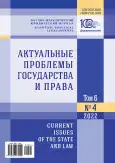The impact of digitalization on the process of legal activity
- Authors: BELYANSKAYA O.V.1, CHOMAEV A.A.1
-
Affiliations:
- North-Caucasus Federal University
- Issue: Vol 6, No 4 (2022)
- Pages: 488-495
- Section: General Theory and History of Law and the State
- URL: https://journal-vniispk.ru/2587-9340/article/view/303876
- ID: 303876
Cite item
Abstract
We consider digitalization as a factor influencing the functioning and development of legal activity, its role in the development of the legal life of Russian society is determined. The development of digitalization in the legal sphere is one of the important conditions for the entry of the Russian Federation into fundamentally new positions in international relations, the assertion of digital sovereignty, which has become very relevant in the light of new challenges and threats to the statehood of Russia. We analyze the opinions of scientists regarding the possibility and extent of the impact of digitalization on legal activity. We evaluate digital technologies from the standpoint of their use in various types of legal activities, primarily in lawmaking and law enforcement, and in general in public administration, which is impossible without the use of digital technologies. The tasks of analyzing the impact of digitalization on the process of carrying out legal activities are to express the author’s position on the role of digitalization in the functioning of the main types of legal activities, to identify problems that arise when using digital technologies in legal activities. We state that digital computer technologies in the legal field should develop in such areas as the automation of typical legal services, the use of online legal services, the “digitization” of public services and their provision online, the transition to a total system of electronic justice, modeling legal decisions based on artificial intelligence, etc. We claim that in the field of legal services, digitalization will ensure their availability and reduce costs, which is achieved by using intelligent automation to perform the actions that a lawyer performs.
About the authors
Olga V. BELYANSKAYA
North-Caucasus Federal University
Author for correspondence.
Email: 520877@mail.ru
ORCID iD: 0000-0002-8936-2766
Candidate of Law, Associate Professor, Associate Professor of Theory and History of State and Law Department
Russian Federation, 1 Pushkin St., Stavropol 355017, Russian FederationAlbert A. CHOMAEV
North-Caucasus Federal University
Email: albert.chomaev@mail.ru
ORCID iD: 0000-0002-0528-1310
Assistant of Theory and History of State and Law Department
Russian Federation, 1 Pushkin St., Stavropol 355017, Russian FederationReferences
- Vlasova E.L., Ustyantseva O.V. Vliyaniye tsifrovizatsii na sokhraneniye tsennykh vidov zhivotnykh [Impact of digitalization on the conservation of valuable species of animals]. Aktual’nye problemy gosudarstva i prava – Current Issues of the State and Law, 2022, vol. 6, no. 1, pp. 19-26. doi: 10.20310/2587-9340-2022-6-1-19-26. (In Russian).
- Samorodov V.Y. Tsifrovizatsiya v sovremennoy kul’ture pravotvorchestva: trend na obnovleniye i pozitivnaya tendentsiya pravovoy zhizni [Digitalization in the modern culture of law-making: a trend for renewal and a positive trend in legal life]. Aktual’nye problemy gosudarstva i prava – Current Issues of the State and Law, 2020, vol. 4, no. 14, pp. 165-179. doi: 10.20310/2587-9340-2020-4-14-165-179. (In Russian).
- Bulgakov V.V., Brosalina A.A. Pravovyye osobennosti okazaniya mer sotsial’noy podderzhki v usloviyakh vnedreniya tsifrovykh platform v gosudarstvennoye upravleniye: rossiyskiy i zarubezhnyy opyt [Legal features of the provision of social support measures in the context of digital platforms introduction into public administration: Russian and foreign experience]. Aktual’nye problemy gosudarstva i prava – Current Issues of the State and Law, 2021, vol. 5, no. 18, pp. 199-213. doi: 10.20310/2587-9340-2021-5-18-199-213. (In Russian).
- Belyayev V.P., Kuzmenko V.I., Kholodova E.I. Ponyatiye i sushchnost’ yuridicheskoy deyatel’nosti [Concept and essence of legal activity]. Sotsial’no-politicheskiye nauki – Sociopolitical Sciences, 2018, no. 4, pp. 83-85. (In Russian).
- Rassolov I.M. Informatsionnoye pravo [Information Law]. Moscow, Urait Publ., 2017, 346 p. (In Russian).
- Svishchenkova K.A. Perspektivy i problemy tsifrovizatsii pravosudiya v Rossiyskoy Federatsii [Prospects and problems of digitalization of justice in the Russian Federation]. Molodoy uchenyy – Young Scientist, 2022, no. 15 (410), pp. 292-294. (In Russian).
- Usacheva E.B., Kirsa A.S. Pravo v usloviyakh tsifrovoy real’nosti [Law in the context of digital reality]. Molodoy uchenyy – Young Scientist, 2020, no. 51 (341), pp. 298-300. (In Russian).
- Kukeyev A.K. Konstitutsionno-pravovyye osnovy organizatsii elektronnogo sudoproizvodstva v Respublike Kazakhstan [Constitutional and legal framework for organizing e-justice in the Republic of Kazakhstan]. Materialy Tret’yey mezhdunarodnoy nauchno-prakticheskoy konferentsii «Tekhnologii XXI veka v yurisprudentsii» [Proceedings of the Third International Scientific and Practical Conference “Technologies of the 21st Century in Jurisprudence”]. Yekaterinburg, Ural State Law University Publ., 2021, pp. 262-272. (In Russian).
Supplementary files








